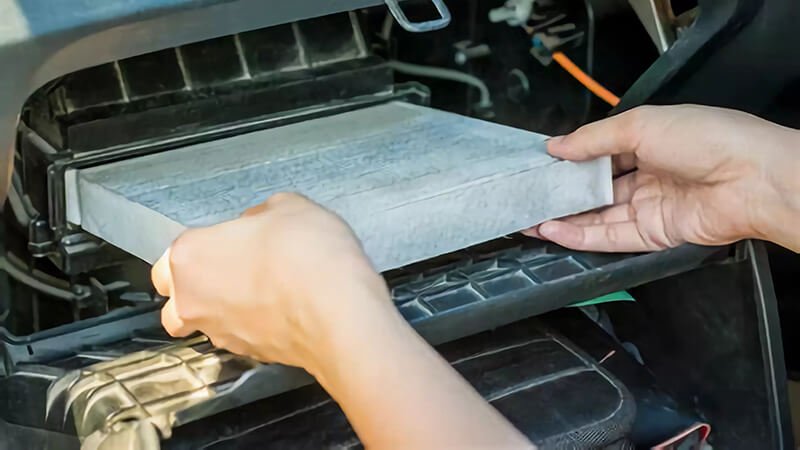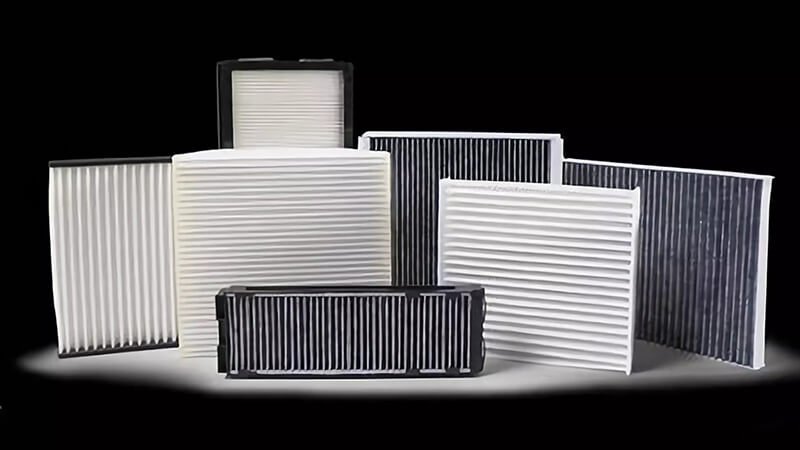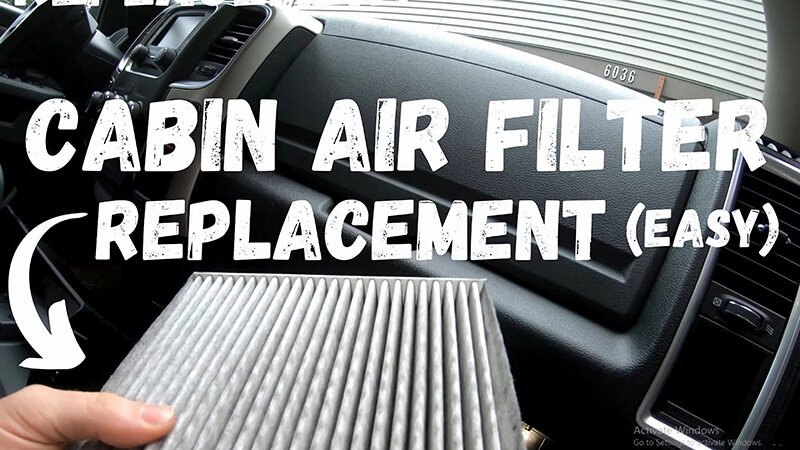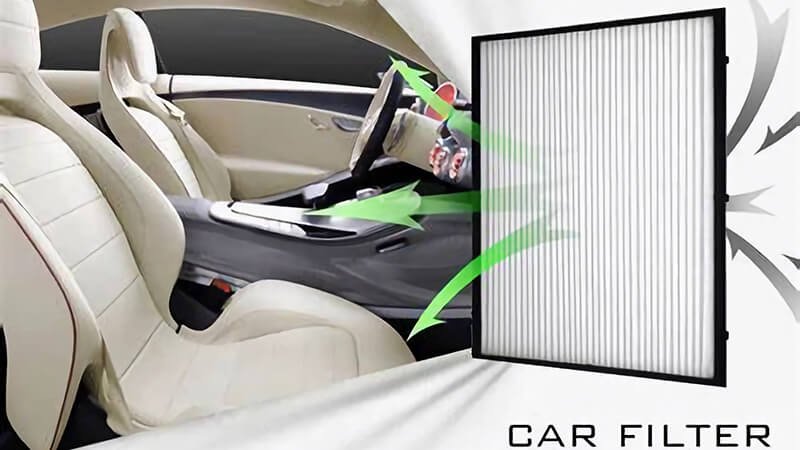Modern drivers expect clean air and comfort inside their vehicles. But few realize how a simple cabin air filter can make or break that experience. Left unchecked, a bad filter leads to foggy windshields, bad smells, and even HVAC failure.
Cabin air filters are essential for trapping dust, pollen, and harmful gases—protecting both drivers and vehicle systems. Without them, you're breathing in pollution and risking HVAC damage.
It’s not just about air—it’s about safety, comfort, and performance. I’ve worked with distributors and fleet operators who saw real cost savings and fewer complaints just by upgrading filters. Let’s take a deeper look.

Can I run my AC without a cabin air filter?
Most drivers don’t think twice about what's behind their dashboard. But when they remove the cabin air filter or ignore replacing it, they unknowingly put their AC system at risk.
Yes, you technically can run the AC without a cabin air filter, but it’s a bad idea. It invites dust, leaves, and debris into the system—leading to fan motor damage, reduced airflow, and contaminated cabin air.
Why running without one is a problem
1. System contamination
When you remove the cabin air filter, outside pollutants enter the HVAC system directly. This buildup restricts airflow and strains the blower motor. I’ve had fleet clients tell me their vehicles’ fan systems broke down within months—just because they didn’t bother replacing a missing filter.
2. Poor air quality
No filter means drivers and passengers breathe in unfiltered air—pollen, soot, dust, even exhaust gases. That’s a major problem, especially for those with allergies or asthma. Our activated-carbon filters at Runex Auto1 are designed to neutralize these threats with layers that block fine particles and absorb odors.
3. Reduced efficiency
A clogged or missing cabin filter2 causes the HVAC system to work harder. That extra load burns more energy, wears out components, and increases fuel consumption. Fleet managers I’ve worked with reported up to 12% higher HVAC-related maintenance costs when filters were skipped during service.
| Risk | With Filter | Without Filter |
|---|---|---|
| Air Quality | Clean, odor-free | Polluted, smells |
| HVAC Wear | Minimal | Accelerated |
| Driver Comfort | Stable | Poor |
| Maintenance Cost | Predictable | Higher and more frequent |

Does cabin air filter affect AC?
Some assume that cabin filters only impact the air inside—not the air conditioning. That’s far from true. A dirty filter has a direct impact on system performance.
Yes, a cabin air filter directly affects AC performance. A clogged filter restricts airflow, making the AC less effective, louder, and more energy-intensive.
How AC performance suffers
1. Reduced airflow
When the filter is full of dust and particles, air can't pass through properly. Drivers often think their AC is broken, but in many cases, a simple filter change fixes the problem.
I remember one case in the UK: a distributor’s customers kept complaining about weak airflow and lingering bad smells. The issue wasn’t the AC—it was cheap paper cabin filters that weren’t trapping much. We switched them to Runex Auto's carbon-layered filters3. Complaints dropped instantly.
2. Higher load on blower motor
The HVAC system has to work harder to push air through a clogged filter. Over time, this shortens the life of components, especially the blower motor. Our filters are engineered with low-flow resistance media—maintaining airflow while trapping up to 98% of particulates.
3. Inconsistent cooling
A dirty filter blocks the proper circulation of cooled air, making the cabin feel warmer even when the AC is on. Especially during summer or peak load periods, this creates discomfort and spikes in complaints from drivers.
| AC Issue | Cause | Solution |
|---|---|---|
| Weak airflow | Clogged or low-quality filter | Replace with high-efficiency filter4 |
| Bad smell | Mold or trapped pollutants in filter | Use activated-carbon cabin filter |
| Overheating system | HVAC strain due to air restriction | Change filter regularly |

How to know if a cabin air filter is bad?
Most drivers forget it’s even there—until they smell something off or hear a strange whine from their AC. But by then, the damage is often underway.
You know a cabin air filter is bad when there’s weak airflow, odd smells, foggy windows, or increased noise from the vents. Visual inspection usually reveals a dark, dirty, and clogged filter.
Key signs of a failing cabin filter
1. Bad odors
Mold, mildew, and trapped pollutants inside the filter produce a musty smell. A logistics company we support told me their drivers refused to use certain vans. The culprit? Basic, moisture-retaining filters that fostered mold. We replaced them with Runex Auto’s activated-carbon filters—smell gone, issue solved.
2. Foggy windshields
A blocked filter5 disrupts airflow across the defogging system. Without warm, dry air circulating, moisture lingers—creating fog and a safety hazard. Our filters use moisture-resistant layers to prevent this issue.
3. Noise from vents
When air has to push through a clogged filter6, it creates a whistling or buzzing noise. That’s stress on the system, and an early sign the filter needs replacing.
4. Visual check
Pull out the filter7. If it’s dark gray or black, or filled with debris, it’s time to swap it. Runex Auto filters have white media with visible carbon layering—you’ll clearly see when it’s time to change.
| Symptom | Likely Filter Issue | Recommended Action |
|---|---|---|
| Musty cabin smell | Mold growth inside filter | Switch to activated-carbon filter |
| Windshield fogging | Poor airflow, excess moisture | Install moisture-resistant media filter |
| Reduced AC airflow | Dust and soot buildup | Change filter regularly (12,000–15,000 km) |
| Strange AC noise | Restricted fan pressure | Inspect and replace clogged filter |

Do all cars have a cabin air filter?
Many drivers are surprised when their mechanic tells them their car doesn’t even have a cabin filter. Others wrongly assume theirs doesn’t—so they never check it.
Most modern vehicles have cabin air filters, but not all. Older models or base trims may lack one. Always check your owner's manual or consult your mechanic.
Why some vehicles don’t have them
1. Age of vehicle
Cabin air filters became common in vehicles after the early 2000s. Before that, many cars didn’t have climate filtration. If you're driving an older model, there's a chance it doesn't have one—or wasn’t designed for it.
2. Trim level
Some base model vehicles skip the cabin filter to reduce cost. However, most models have a slot for one—even if not originally included. We’ve worked with distributors who began offering retrofit filters8 to customers once they realized how many older vehicles could accept a modern upgrade.
3. Regional standards
Some markets don’t prioritize interior air filtration due to local regulations. That’s why Runex Auto9 offers customizable filter solutions for distributors based on local climate, pollution level, and vehicle type. Whether it’s high-smog cities or rural areas with lots of pollen, we build to fit.
| Vehicle Type | Cabin Filter Included | Notes |
|---|---|---|
| Modern sedans (post-2010) | Yes | Usually in glovebox or behind dashboard panel |
| Pickup trucks (older) | Sometimes | Check manual; may have retrofit slot |
| Budget compact cars | Not always | Varies by market and trim level |
| Commercial vans | Yes (usually) | Important for driver comfort, HVAC longevity |

Conclusion
Cabin air filters10 might be small, but their impact is big. From protecting HVAC systems to ensuring a fresh, safe ride, they matter more than most drivers think. At Runex Auto, we design our filters with real-world conditions in mind—layered carbon for odor removal, high-efficiency media for particle blocking, and OEM specs for a perfect fit. Whether you're managing fleets or supplying local garages, choosing the right cabin filter means fewer complaints, lower costs, and happier customers.
-
Discover how Runex Auto's filters can improve air quality and protect your vehicle's HVAC system, ensuring a healthier and more efficient driving experience. ↩
-
Discover how a cabin filter protects your vehicle's HVAC system, ensuring clean air and reducing maintenance costs, enhancing overall driving comfort. ↩
-
Explore the advantages of carbon-layered filters to enhance your car's air quality and performance. ↩
-
Learn how high-efficiency filters can significantly boost your car's AC performance and longevity. ↩
-
Understanding the impact of a blocked filter can help prevent safety hazards like foggy windshields and ensure optimal vehicle performance. ↩
-
Discover how a clogged filter can lead to noise, reduced airflow, and potential damage, ensuring you maintain a safe and comfortable driving experience. ↩
-
Learn the correct method to remove your cabin filter for inspection, ensuring you can easily identify when it needs replacement and maintain air quality. ↩
-
Explore how retrofit filters can enhance older vehicles' air quality and meet modern standards. ↩
-
Discover how Runex Auto tailors air filters to meet specific regional needs, ensuring optimal air quality in diverse environments. ↩
-
Find the best quality OEM Auto Cabin Air Filter from Runex. ↩













